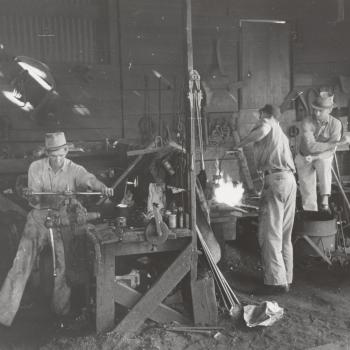The Working Catholic: After Covid by Bill Droel
The parish’s live-stream Mass should continue. In fact, we should invest in a second camera and even consider some programming during the week. No, say other parish leaders. Live stream was helpful, but its continuation will discourage people from returning to the church building.
Similar questions are raised about parish meetings via Zoom; about the merits of investing more time and money in the parish website; about the viability of the parish bulletin; about pre-packaged religious education materials accessed on the internet; or about communicating with the entire parish by way of Listserv or Twitter.
Those parish leaders that want to make sound decisions might use these coming weeks to study and reflect upon the nature of media, particularly of satellite-dependent communication. Start with Marshall McLuhan (1911-1980). His books require patience because McLuhan was deeply learned “and he was determined to show off,” writes Adrian Daub in What Tech Calls Thinking (Farrar, Straus, 2020). “That means lots of allusions, weird digressions, examples that don’t seem to illustrate the thing they are supposed to illustrate.” But McLuhan, writing before the internet, has yet to be displaced as the foremost communication theorist. He coined common terms like global village and surfing. Yet most techies, I suspect, have never studied him.
Every parish has some leaders who are proficient with computers. Most parishes have a staff member who can maintain its website, program its roadside sign and help other staff members whose computer is nonresponsive. A parish’s computer-savvy types might meet (in cyberspace or in the parish office) to consider the future of parish communication (live-stream Mass, website, bulletin, etc.). 90% of the conversation, I predict, will be about content and hardware, not about the nature of media.
McLuhan’s basic insight is contained in his phrase, the medium is the message. The specific technology or the medium, he writes, actively “shapes and controls the scale and form of human association.” Daub explains: “McLuhan regarded those analysts who focused their attention on the content of books or TV shows as dupes… The medium is for those who get it. The content is for idiots, naifs, sheep.” Well, that’s strong language, but the point is crucial. Having a TV, for example, in one’s home, irrespective of the content of any show and regardless of its hours of use, changes the environment. The invention of TV changes human interaction. The same is true with a computer in the house or a mobile device in one’s pocket. Regardless of the software, regardless of the content of any website or any posting, the internet in itself changes human interaction.
Is the change for the better or worse? McLuhan compared media, one to another– radio, TV, magazine ads, other printed material and more. Yet his reflections were “free of value judgment,” writes Daub. Most people back in the day presumed that McLuhan was a champion of whatever is the latest. I knew that McLuhan was a traditional Catholic, uncomfortable with Vatican II liturgy. Thus I presumed he was warning against the latest. Yet as Daub insists, “What made McLuhan’s theory distinctive was that he didn’t bother to ask whether this was a good thing or a bad thing.”
Should live-stream Mass continue? Should more money go toward the parish website? Should worshipers be encouraged to bring mobile devices to church? Should a video screen be mounted near the altar? Should the weekly bulletin be abandoned?
Start with prior questions, McLuhan says. Despite its fans, don’t Facebook and other social media (regardless of content) actually individuate? Is a Mass that reaches the faithful by way of a satellite adding to inclusivity or by the nature of the medium does a broadcast Mass soon enough displace community? Is the Eucharist really present inside a church if a significant number of worshipers regularly participate remotely in the Mass? Does a printed bulletin carry the gospel deeper into the mind and behavior of a parishioner than the parish website? Is it efficient to eliminate all on-site parish meetings in favor of Zoom or does the discursiveness during in-person meetings add something to the parish? Is it better to do a little of everything or is it better to stake the gospel on the latest and slickest technology as much as possible?
Think about the medium. The content is quite secondary.










